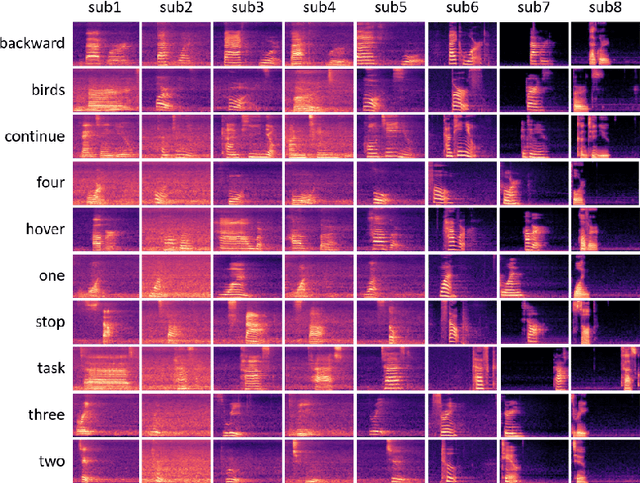A Multi-tasking Model of Speaker-Keyword Classification for Keeping Human in the Loop of Drone-assisted Inspection
Paper and Code
Jul 08, 2022



Audio commands are a preferred communication medium to keep inspectors in the loop of civil infrastructure inspection performed by a semi-autonomous drone. To understand job-specific commands from a group of heterogeneous and dynamic inspectors, a model needs to be developed cost-effectively for the group and easily adapted when the group changes. This paper is motivated to build a multi-tasking deep learning model that possesses a Share-Split-Collaborate architecture. This architecture allows the two classification tasks to share the feature extractor and then split subject-specific and keyword-specific features intertwined in the extracted features through feature projection and collaborative training. A base model for a group of five authorized subjects is trained and tested on the inspection keyword dataset collected by this study. The model achieved a 95.3% or higher mean accuracy in classifying the keywords of any authorized inspectors. Its mean accuracy in speaker classification is 99.2%. Due to the richer keyword representations that the model learns from the pooled training data, adapting the base model to a new inspector requires only a little training data from that inspector, like five utterances per keyword. Using the speaker classification scores for inspector verification can achieve a success rate of at least 93.9% in verifying authorized inspectors and 76.1\% in detecting unauthorized ones. Further, the paper demonstrates the applicability of the proposed model to larger-size groups on a public dataset. This paper provides a solution to addressing challenges facing AI-assisted human-robot interaction, including worker heterogeneity, worker dynamics, and job heterogeneity.
 Add to Chrome
Add to Chrome Add to Firefox
Add to Firefox Add to Edge
Add to Edge